
April 27, 2016 • No. 14 | PDF Previous Issues
April 28 — National Day of Mourning for Workers Killed and Injured on the Job
Mourn for the Dead! Fight for the Living! Stop the Killing!




Workers’ memorials across the country. Left to right: Pictou, Nova Scotia monument to those killed in Westray mine disaster; Sudbury Miners Memorial; Edmonton Day of Mourning workers’ memorial; BC forestry workers’ memorial park. Below: memorial in Kanesatake to the workers who died in the 1907 collapse of the Quebec Bridge.
On April 28, the National Day of Mourning for Workers Killed and Injured on the Job the Marxist-Leninist Party of Canada pays its deepest respects to the families of all those Canadian workers who have died on the job or as a result of job-related diseases and injuries.
April 28 — National Day of Mourning
CALENDAR OF EVENTS |
We express our firm support for all the injured workers who have to cope with their disabilities as a result of work related injuries or diseases. We salute all those workers who are fighting to uphold health and safety on the job in conditions of impunity for the monopolies. We condemn the governments at various levels for making these workers targets of their anti-social offensives which seek to restructure compensation programs to force workers to rely on private insurance companies which have the aim of getting workers to fend for themselves.
The MLPC calls on Canadians across the country to take part in commemorations and take up the demands of the workers’ movement for justice and an end to attacks on workers’ health and safety.
In Canada there are about 1,000 annual Canadian workplace fatalities. Across Canada, worker compensation boards in 2014 recorded 239,462 lost-time accidents This represents only 30 per cent of all disabling injuries and illnesses suffered annually by Canadian workers.
“The number of Canadian workers who die annually through occupational injuries or diseases doesn’t reflect the fact that for every worker who dies, on average 30 workers suffer permanent physical or mental impairments, often lose their employment and many times are pushed to the margins of society,” a press release of the United Steelworkers says.
“Fewer than half of all Canadians with disabilities are employed, compared to 80 per cent of the general population, and those on a social security program receive between 22-30 per cent of the average net income for all employed Canadians.”
The International Labour Organization reported in 2014 that around the world every day, 6,300 workers die from a work-related accident or disease.
Affirm Workers’ Health and Safety!
Together, Let Us Build a Society Fit for Human Beings!
Mourn for the Dead, Fight for the Living!
In the Parliament
Bills Before the House
Parliament is now recessed until Monday, May 2 following a session from April 11 to April 22. That session also followed a two week recess from March 28 to April 8.
 There are now 12 pieces of government legislation which have been introduced and not yet passed. The farthest any regular bill has yet gone in the House of Commons is to second reading and referral to committee. The only bills to have passed are Appropriation Acts allowing funds from the public treasury to be spent by the government.
There are now 12 pieces of government legislation which have been introduced and not yet passed. The farthest any regular bill has yet gone in the House of Commons is to second reading and referral to committee. The only bills to have passed are Appropriation Acts allowing funds from the public treasury to be spent by the government.
Bills to repeal anti-worker private members’ bills adopted under the previous government (Bill C-4); to amend the Citizenship Act (Bill C-6); and to amend the powers of the Treasury Board over federal public sector workers’ sick leave (Bill C-7); the “middle-class tax cut” changes to the income tax regime (Bill C-2); and to amend the Air Canada Public Participation Act (Bill C-10) are now at the committee stage. All other bills are at first reading.
The most recent bills introduced are:
Bill C-14, An Act to amend the Criminal Code and to make related amendments to other Acts (medical assistance in dying) which comes in response to the Supreme Court ruling in Carter v Canada which struck down existing prohibitions on physician-assisted suicide. Bill C-14 establishes a legislative framework to allow the practice and specify eligibility criteria.
Bill C-15, Budget Implementation Act, 2016, No. 1, which amends laws and regulations in accordance with the measures laid out in the 2016 federal budget introduced on March 22.
For a list of legislation before the Parliament, click here.
Omnibus Budget Implementation Bill
On April 20 Minister of Finance Bill Morneau introduced Bill C-15, Budget Implementation Act, 2016, No. 1. The bill amends or repeals around 40 laws and changes various other regulations in order to put in place the measures described in the federal budget introduced on March 22.
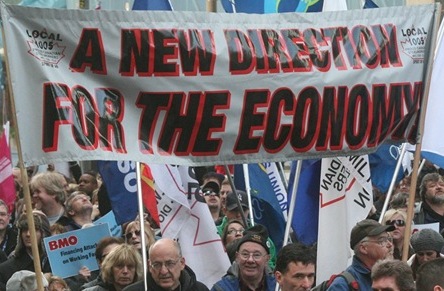 Debate on the federal budget continued from April 19 to 22. Since it was introduced the Finance Minister, the Prime Minister and other ministers and MPs have been making promotional appearances with Canadian and foreign business interests as well as at universities. The first event was on March 23, a post-budget breakfast hosted by the Ottawa Business Journal and Ottawa Chamber of Commerce on March 23 at the Fairmont Château Laurier.
Debate on the federal budget continued from April 19 to 22. Since it was introduced the Finance Minister, the Prime Minister and other ministers and MPs have been making promotional appearances with Canadian and foreign business interests as well as at universities. The first event was on March 23, a post-budget breakfast hosted by the Ottawa Business Journal and Ottawa Chamber of Commerce on March 23 at the Fairmont Château Laurier.
Subsequent events were hosted by the Chamber of Commerce and Industry of Rive-Sud, Quebec on March 29; representatives of financial interests in New York, Paris and London, England from March 30 to April 1; at the University of New Brunswick and then the Port of Sydney Development Corporation in Sydney, Nova Scotia on April 5; At the Communitech Corporation and later the University of Waterloo on April 7; at the Canadian Club of Toronto, Empire Club of Canada and Filipino Centre Toronto on April 8; and at the meetings of G20 Finance Ministers and Central Bank Governors, International Monetary Fund and World Bank in Washington, DC from April 13 to 16.
TML Weekly points out, “With Trudeau’s Budget 2016, the direction of the economy remains empire-building, firmly in the hands of the rich and their class privilege. The great actual and potential social wealth of the country is being mobilized through the state to consolidate the iron grip of the rich over the economy and its direction.”
For information about the issue of infrastructure spending in the 2016 federal budget, an area where the Liberals have been most self-congratulatory, see “Infrastructure Spending to Pay the Rich, Consolidate Empire-Building and Strengthen Class Privilege,” TML Weekly, April 16, 2016 – No. 16.
Debates in the House
Office of Religious Freedom
On March 21, the House debated a Conservative opposition motion calling on the government to support the Office of Religious Freedom. This is an office within the department of Foreign Affairs which the Harper government created as a means to infiltrate divide and rule politics into the Middle East in the name of rights. The Liberals say they are contemplating abolishing the office because they say their foreign policies already take the defence of religious minorities into account. Debate on the opposition motion centred on whether Canada should promote religious freedom with a specific office or as part of the government’s overall human rights agenda.
Renewal Update considers the discussion to be diversionary because it averts the central issue which is the conception that various countries such as Syria, Iraq, and others should not be permitted to have secular regimes but on the contrary be balkanized on the basis of religious and ethnic-based considerations. Who defines the rights of citizens has become a very contentious issue. Should it be the citizens themselves based on a modern process within a definite body politic, to realize the aims they set for that polity, or should it be foreign powers which impose anachronistic Eurocentric definitions which are in crisis even within the territories of those foreign powers, as is the case in France, Britain and Canada? The way that Canada is approaching this issue in line with U.S. aims for the Middle East continues to attack the rights of the peoples to define themselves.
Private Member’s Bills
Private members’ bills were debated for the first time since the federal election on Monday, April 11. Members of Parliament who are not government ministers may introduce legislation so long as it does not concern public finances, but must enter a lottery to decide which bills will be debated and in what order. There are currently 63 private members’ bills for the current session of Parliament. One such bill moved for debate was Bill C-234, An Act to amend the Canadian Labour Code (replacement workers) introduced by NDP MP Karine Trudel (Jonquière) which would “make it an offence for employers to hire replacement workers to perform the duties of employees who are on strike or locked out.” Liberal MPs opposed the bill, saying what is needed is a “a tripartite, consensus-building process,” meaning a three-way “agreement” between business, government and labour.
Nation-Wrecking Changes to Air Canada Public Participation Act
On April 15 debate began on Bill C-10, An Act to amend the Air Canada Public Participation Act and to provide for certain other measures. The bill had second reading and was referred to committee on April 20. The amendments if passed would allow Air Canada to control the type and the volume of any aircraft maintenance work of its fleet in Canada, something which is currently defined in the legislation but is being flaunted by Air Canada. By amending the legislation the Liberals would effectively make legal Air Canada’s violation of the law. The Liberals are now following up on the Harper government’s use of its majority to force striking Air Canada maintenance workers back to work, claiming that their legitimate demands were threatening the Canadian economy.
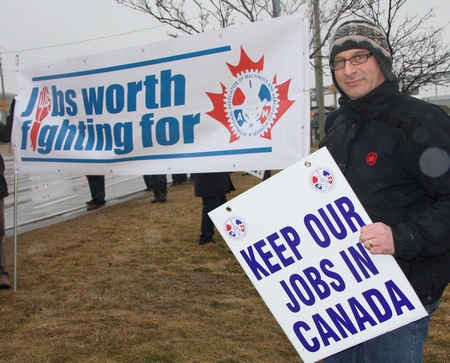 In advance of the debate, International Association of Machinists Transportation District 140 President and Directing General Chairperson Fred Hospes held a press conference on Parliament Hill to call on MPs to oppose the Bill. “We are asking every MP to oppose Bill C-10 and keep these jobs in Canada. Under these amendments, Air Canada is under no obligation to perform any of its maintenance work in Canada,” he said.
In advance of the debate, International Association of Machinists Transportation District 140 President and Directing General Chairperson Fred Hospes held a press conference on Parliament Hill to call on MPs to oppose the Bill. “We are asking every MP to oppose Bill C-10 and keep these jobs in Canada. Under these amendments, Air Canada is under no obligation to perform any of its maintenance work in Canada,” he said.
The union points out that Air Canada sold its heavy maintenance to Aveos Fleet Performance 2007 who continued operations in the three centres until in went bankrupt in 2012 and 2,600 IAM members lost their jobs. Air Canada then moved most of its heavy-maintenance work out of the country. “When we called upon the Harper government to intervene in 2012 to save this important employer and those 2,600 jobs, they refused,” explained Hospes.
“We were pleased when the Quebec government, supported by Manitoba, took up our case,” said IAM Quebec coordinator David Chartrand. “In November 2015, the Quebec Court of Appeal ruled the Act still required Air Canada to perform its heavy maintenance and overhaul work in Montreal, Mississauga and Winnipeg.”
The IAM points out that it was shocked on February 17, 2016 when the government of Quebec announced it would drop its litigation. “At the same time, the Trudeau Liberals, who in opposition denounced the Harper government for its inaction, were now going even further,” explained Chartrand. “The Government said that it planned to modernize the Act to remove any real requirement for Air Canada to do any of its maintenance work in Canada, in exchange for vague promises of future work at Centre’s of Excellence tied to the Air Canada purchase of 45 C-Series airliners.”
“If Air Canada believes that Bombardier’s C-Series aircraft makes operational and financial sense for them, there should be no need to bribe them with a free pass to offshore all of their maintenance work,” explained Chartrand.
“We will be bringing forward a petition and will aggressively lobby all parties to kill Bill C-10,” said Hospes. “We want to meet with the minister. We need to be building industries like aircraft maintenance in Canada, not inviting them to leave.”
Emergency Debate on Crisis in Attawapiskat
An emergency debate was held on Tuesday, April 12 from 6:00 pm to midnight concerning the state of emergency declared in Attawapiskat, a First Nation in northern Ontario. At the debate on April 12 and elsewhere ministers cited the 2016 federal budget as making “historic investments” but these fall far short of what is required to provide adequate services and living conditions.
Attawapiskat is facing a serious crisis in which high numbers of youth have attempted suicide in recent months. Since Attawapiskat declared the state of emergency on April 9, the federal government has sent teams to provide mental health support in the form of counsellors and other support workers but many have pointed out that this is not enough. On April 18, Indigenous Affairs Minister Carolyn Bennett visited Attawapiskat with local MP Charlie Angus, also the NDP Critic for Indigenous and Northern Affairs and announced that the government would fund the construction of a youth centre in the future, one of the demands of community members.
 An article in TML Weekly April 16 pointed out that “the occupation and exploitation of [Indigenous] lands, some with treaties and many without, bring the obligation of the state to pay rents in perpetuity and make sure all services are provided at the highest possible level… Far from acting as if the government is being magnanimous towards the Indigenous peoples it must recognize as a starting point that these monies belong to the Indigenous peoples because Canadians have made their home on native land. It is not charity.” Actions took place across Canada from April 13 demanding that the long years of criminal underfunding of social programs to Indigenous people be ended and that the Liberals immediately allocate the funds necessary to address the needs in Attawapiskat and other Indigenous communities.
An article in TML Weekly April 16 pointed out that “the occupation and exploitation of [Indigenous] lands, some with treaties and many without, bring the obligation of the state to pay rents in perpetuity and make sure all services are provided at the highest possible level… Far from acting as if the government is being magnanimous towards the Indigenous peoples it must recognize as a starting point that these monies belong to the Indigenous peoples because Canadians have made their home on native land. It is not charity.” Actions took place across Canada from April 13 demanding that the long years of criminal underfunding of social programs to Indigenous people be ended and that the Liberals immediately allocate the funds necessary to address the needs in Attawapiskat and other Indigenous communities.
In the emergency debate, Minister of Justice Jody Wilson-Raybould indicated for the first time the Liberal government’s plans to replace the Indian Act, which as of April 12 has been in place for 140 years, with a “reconciliation framework.” Wilson-Raybould did not speak of modernizing the Constitution but said that a new relationship between Canada and Indigenous peoples should be based on Section 35 of the Constitution along with the UN Declaration on the Rights of Indigenous Peoples (UNDRIP), which the government says it plans to implement. Wilson-Raybould called this completing the “unfinished business of Confederation.” Section 35 states that “existing aboriginal and treaty rights of the aboriginal peoples of Canada are hereby recognized and affirmed.”
Wilson-Raybould pointed out that “For Attawapiskat and for all First Nations, the Indian Act is not a suitable system of government, it is not consistent with the rights enshrined in our constitution, the principles as set out in [UNDRIP] or calls to action from the Truth and Reconciliation Commission report.” There is broad agreement to abolish the Indian Act, which Ontario Regional Chief Isadore Day noted on the 140th anniversary is “the root of all social trauma currently affecting all First Nation communities across Canada,” but the question being asked by Indigenous people and Canadians now is what precisely does the government plan to replace it with and what are the requirements today.
Renewal Update thinks that the 140th anniversary of the Indian Act and the 150th anniversary of Confederation which will be marked in 2017 are occasions to involve the people in working out what are these requirements. Far from the Indian Act being in conflict with Canada’s Constitution, it is the Constitution itself which is anachronistic and has failed to guarantee the rights of Indigenous peoples or Canadians. Without starting from the objective requirements of the 21st century in a modern society such as Canada and the recognition of the inviolable rights of Indigenous peoples to decide their own destiny, efforts to undo the crimes committed under the Indian Act will not get far, and the people will have every reason to be wary of what the Liberals have to offer.
Information about federal budget 2016 underfunding of programs and services for Indigenous peoples is available in the following article: “Unacceptable Continued Government Underfunding of Social Programs for Indigenous Peoples,” TML Weekly, April 16, 2016 – No. 16.
Matters of Concern to Canadians
Liberal Government Expands Temporary Foreign Worker Program
In February, the Liberals quietly removed a regulation that capped the number of foreign workers working below a provincial median wage at 10 per cent of a company’s workforce, but only for businesses in seasonal industries.
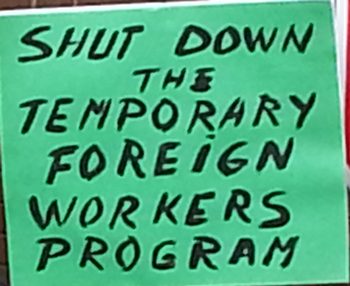 The removal of the cap means, for example, that employers such as fish canneries and resorts can bring in as many such workers as they want so long as the employment term is under 180 days. Under the former regulations, the limit was 120 days.
The removal of the cap means, for example, that employers such as fish canneries and resorts can bring in as many such workers as they want so long as the employment term is under 180 days. Under the former regulations, the limit was 120 days.
The easing of restrictions applies to all seasonal workers.
In 2014, then third-party leader Justin Trudeau wrote a column for the Toronto Star criticizing the Temporary Foreign Worker Program, and calling for it to be “scaled back,” The Tyee reports.
Trudeau said the program “drives down wages and displaces Canadian workers” due to loose restrictions under the Conservatives.
“First, the Temporary Foreign Worker Program needs to be scaled back dramatically over time, and refocused on its original purpose: to fill jobs on a limited basis when no Canadian workers can be found,” he wrote.
The exemptions are being used by Alberta resorts to hire temporary foreign workers, said Gil McGowan, President of the Alberta Federation of Labour
“It might lead to some kind of political or social explosion,” he said. “If [Albertans] get wind the Liberals are opening up the program again while unemployment rates are at levels we haven’t seen in more than a generation, I’m afraid that people will simply lose it.”
McGowan said the Liberals have not spoken to him about the matter, and called the move the “worst kind” of political bait and switch.
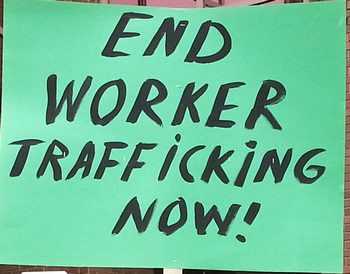 “The Liberals didn’t run on a promise of expanding the Temporary Foreign Worker Program,” McGowan said. “In fact, quite to the contrary: whenever they talked about it they said the program was exploitative.”
“The Liberals didn’t run on a promise of expanding the Temporary Foreign Worker Program,” McGowan said. “In fact, quite to the contrary: whenever they talked about it they said the program was exploitative.”
NDP Labour Critic Niki Ashton said she asked Employment Minister MaryAnn Mihychuk to show the materials used in the government’s recent decision to approve an exemption that allows companies to bring in unlimited numbers of temporary foreign workers to fill seasonal jobs this year.
“I asked her to share the reports that guided her to the decision she’s making,” Ashton said, noting the conversation happened at a Monday committee meeting. “There are no reports. She gave this generic answer following my question.”
(The Tyee)
Canada Must Not Be Given Responsibility for UN Occupation of Haiti
At a time when the Canadian government is seeking command of the United Nations Stabilization Mission in Haiti (MINUSTAH), a UN report made public on March 10 reveals that its police forces there have been engaging in sexual misconduct while on duty. Some of these activities may constitute crimes if committed without consent which is likely under circumstances imposed on the people of Haiti. Far from taking any responsibility, these officers on an official government mission were barely reprimanded and the government of Canada made a mealy-mouthed remark about “cracking down.” None of this is acceptable and it must not pass.
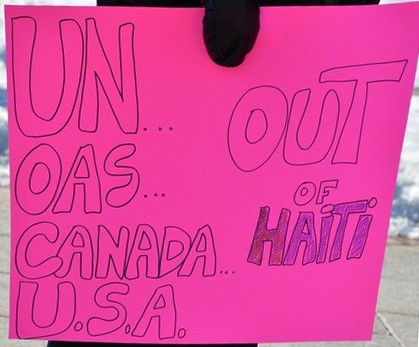 The Haitian people should be paid full reparations for everything that has befallen them since the U.S., Canada and France staged the coup d’etat against them in 2004. They should be compensated for all the crimes and deaths which have befallen them since the devastating earthquake in 2010, including the cholera outbreak traced to poor sanitation by MINUSTAH troops. All of this is proof positive that the entire MINUSTAH mission should be ended and Canada must not be entrusted with leading the mission. Its attitude towards the misconduct of its own police forces is criminal and cannot be excused.
The Haitian people should be paid full reparations for everything that has befallen them since the U.S., Canada and France staged the coup d’etat against them in 2004. They should be compensated for all the crimes and deaths which have befallen them since the devastating earthquake in 2010, including the cholera outbreak traced to poor sanitation by MINUSTAH troops. All of this is proof positive that the entire MINUSTAH mission should be ended and Canada must not be entrusted with leading the mission. Its attitude towards the misconduct of its own police forces is criminal and cannot be excused.
The UN report reveals that at least three Canadian police officers within the “peacekeeping” mission engaged in sexual misconduct against Haitians in the past year. Members of UN operations are prohibited by UN rules from engaging in “sexual relations with prostitutes and with any persons under 18, and strongly discourage relations with beneficiaries of assistance (those that are receiving assistance food, housing, aid, etc… as a result of a conflict, natural disaster or other humanitarian crisis, or in a development setting).” One of the officers was suspended for nine days, another for five, while a third is awaiting a hearing by the Sûreté du Québec (SQ) disciplinary board. In another case reported by Radio-Canada that took place in 2013 an SQ officer left Haiti after being involved in sexual misconduct. Once home, he resigned in order to avoid appearing before the force’s disciplinary committee. The misconduct of at least two Canadian police led to children being born who were abandoned and are now without child support.
In response to the reports, Global Affairs Canada told media that it will “work with the UN to crack down on the problem,” and added that it “takes all allegations of misconduct seriously.” This statement can only be considered dismissive and such an attitude is not acceptable. The government considers it to be a personal matter between these officers and their victims who are given no possibility for redress. What does the government mean when it says it will “work with the UN to crack down on the problem” when its method for dealing with these problems are to subject individuals to minor and temporary penalties?
The UN Report
For the first time, the 2016 report on sexual exploitation and abuse within the UN system lists the names of the countries of alleged perpetrators. It showed “a marked increase from the number of allegations [of sexual exploitation and abuse in UN missions] from the number of allegations recorded in 2014 (52),” making up 69 of the total 99 allegations lodged against UN personnel serving in “peace operations.” Nine allegations of sexual misconduct received in 2015 relate to the mission in Haiti, the most for any single country in which the UN has a “peacekeeping” presence. The crimes Canada is accused of are classified as “exploitative relationships” and some include the designation “(paternity)” to indicate that a child was born as a result of Canadian sexual misconduct. The report does not elaborate on the nature of the crimes committed by Canadian police.
All Foreign Troops Must Leave Haiti
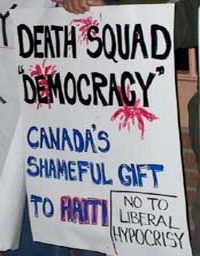 Reports in March citing sources in Ottawa and Port au Prince, Haiti revealed that Canada is seeking take command of MINUSTAH. The UN occupation force was first imposed on the people of Haiti in 2004 to suppress their resistance to the foreign-sponsored coup d’état against the government of President Jean-Bertrand Aristide. The coup was supported by Canada both in its initial stages and after the overthrow of the popular Aristide government.
Reports in March citing sources in Ottawa and Port au Prince, Haiti revealed that Canada is seeking take command of MINUSTAH. The UN occupation force was first imposed on the people of Haiti in 2004 to suppress their resistance to the foreign-sponsored coup d’état against the government of President Jean-Bertrand Aristide. The coup was supported by Canada both in its initial stages and after the overthrow of the popular Aristide government.
The Haitian people do not want Canada in Haiti nor the UN occupation force designated as a “peace operation” that has been imposed on them. This they have made clear many times, including in their recent defeat of a fraudulent electoral process to give legitimacy to the occupation. All kinds of crimes against the Haitian people have already been committed and more are in the making as a result of the imperialists’ schemes to take over the country based on the fraud of preventing it from becoming a failed state.
The MLPC calls on Canadians to demand that the government stop its interference in the affairs of the Haitian people and pay reparations for the crimes it has committed against them. The Haitian people deserve the unreserved support of the Canadian people not only in bringing those individuals to justice who engage in crimes of sexual exploitation and abuse but also in getting rid of all those powers dead set on preventing them from charting an independent path for themselves.
Unsound Definition of “Stability”
At a press conference on April 13 Minister of Foreign Affairs Stéphane Dion refused to apologize for misleading Canadians on export permits for the sale of Canadian-made light armoured vehicles (LAVs) and called Saudi Arabia a “strategic partner in an increasingly volatile region.”[1]
 The memo from Global Affairs which contained Dion’s authorization for export permits for the LAVs characterized Saudi Arabia as “a key partner for Canada, and an important and stable ally in a region marred by instability, terrorism and conflict… Canada appreciates Saudi Arabia’s role as a regional leader promoting regional stability, as well as countering the threat posed by Iranian regional expansionism and ISIS,” the memo said. The Saudi war against Yemen which began on March 26, 2015 was described as “countering instability.”
The memo from Global Affairs which contained Dion’s authorization for export permits for the LAVs characterized Saudi Arabia as “a key partner for Canada, and an important and stable ally in a region marred by instability, terrorism and conflict… Canada appreciates Saudi Arabia’s role as a regional leader promoting regional stability, as well as countering the threat posed by Iranian regional expansionism and ISIS,” the memo said. The Saudi war against Yemen which began on March 26, 2015 was described as “countering instability.”
A briefing book to Prime Minister Trudeau prepared by federal officials and obtained by media in January said, “Further deepening of strategic relations with the Gulf Co-operation Council (GCC) countries [led by Saudi Arabia] would serve Canadian commercial and possibly security interests.” Canada’s Ambassador to Saudi Arabia, Dennis Horak told media on April 18 that the two countries have had “nearly similar approaches on Syria, Yemen, Iraq and the Middle East Peace Process.”
The role of Saudi Arabia today can only be understood within the context of the strategy of the U.S. imperialists to smash the resistance movements of the Palestinian, Lebanese, Yemeni, Syrian and other peoples of the region, effectively bring about the “regime changes” so as to impose their hegemony on the region and smash the contention of their rivals. These aims are the current cause of instability, insecurity and war in the region.
Canada is fully integrated into this U.S. strategy, both directly as a result of integrating Canadian forces under U.S. Command, as well as through NATO. The new Liberal government is elevating the nation-wrecking justifications to an unprecedented level to push the old divide and rule strategies. They claim to uphold rights but do so by defining them on the basis of sectarian politics where the polity is not united on the basis of modern criteria, but on the basis of religions, ethnic and tribal considerations and the like. The U.S. imperialists present a colonial fantasy image of the Middle East as a tug of war between these divisions based on which they and the forces under their command in Canada and Saudi Arabia intervene to dominate all.
The targets of attack are the forces resisting these aims in Palestine, Lebanon, Syria, Iraq and Yemen, Libya and other countries who are then blamed for causing instability. Meanwhile, Canada, the U.S. and Saudi Arabia are active training and financing “opposition” forces in Syria and elsewhere which have shown themselves to be terrorist groups which have nothing to do with politics or providing real problems with viable solutions on a modern basis or nation-building. Untold numbers of weapons from Saudi Arabia, mostly originating from the U.S., have been provided to forces fighting for regime change in Syria.
In Yemen, Saudi Arabia is waging a U.S.-authorized war under the pretext that the resistance forces in that country are “backed by Iran” and that this is the source of instability.
A report issued on March 29 by the United Nations Children’s Rights & Emergency Relief Organization (UNICEF) provides a picture of the instability, anarchy, violence and suffering which the U.S. is causing in Yemen under the auspices of its proxy, Saudi Arabia.
The UNICEF report is entitled Children on the Brink: The Impact of Violence and Conflict on Yemen and Its Children. It notes that as a result of the Saudi bombing Yemen is “in the midst of an acute humanitarian crisis.” The report notes the deaths of more than 900 children in the past year as a result of the war, representing around one-third of all civilian deaths since March 2015. Sixty-three health facilities have been attacked. The conflict “has forced the majority of Yemenis into destitution… 82 per cent of the total population need urgent humanitarian assistance. Almost half of those in need are children.” UNICEF also says that the war has restricted imports, blocked the delivery of critical goods and cut short supplies of food and fuel.
Despite this, the government of Canada denies that its weapons are used by Saudi Arabia to commit crimes. It says there is no hard evidence that this is the case and pretends that if hard evidence were found, it would rescind the export agreements.
Even though most people would call this an example of criminal negligence, the government calls this an example of “responsible conviction.” Canadians cannot accept such deceit. Deceit refers to the action or practice of deceiving someone by concealing or misrepresenting the truth. It is to engage in double-dealing, fraud, cheating, chicanery, deviousness, lying, pretense, treachery. That is the truth of the matter as concerns the justification provided for Canada’s arms sales to Saudi Arabia.
For Your Information
Today Saudi Arabia is the second largest destination for Canadian weapons exports. Canada’s overall arms exports are shrouded in mystery as the U.S. is the largest destination and due to specific agreements integrating Canadian and U.S. war production the figures are not reported. Saudi Arabia became the largest importer of arms worldwide in 2014. Its yearly imports increased by 275 per cent from 2006 to 2015. From 2011 to 2015 more than $100 billion worth of weapons were purchased from the U.S., and it and Britain make up a bulk of Saudi sources of weapons.
Canadian weapons sales to Saudi Arabia were previously concluded through the U.S. Foreign Military Sales program but with the overall increase in sales have been increasingly arranged by the government through Crown corporations. The Canadian Commercial Corporation, a Crown corporation known as the Government of Canada’s defence and security export sales organization, brokered a deal in 2014 to sell Saudi Arabia an undisclosed number of Light Armoured Vehicles (LAV) for $14.8 billion. The contract is said to be Canada’s largest (recorded) military export of all time. The contract was secured by General Dynamics Land Systems (GDLS), which produces the LAV III currently used by the armed forces of Canada, New Zealand, Saudi Arabia and Colombia. A similar vehicle sold by GDLS, the Stryker, is in use by the U.S. The LAV III typically has a chain gun or autocannon as its main armament and a machine gun as its secondary armament, as well as grenade launchers.
Since 1993 General Dynamics Land Systems, the manufacturer of the LAVs has been granted export permits for the sale of almost 3,000 LAVs along with their associated weapons systems and spare parts to Saudi Arabia for its regular and National Guard forces, with not one application for a permit ever having been denied.
The government’s annual Reports on Exports of Military Goods from Canada says that Canada “closely controls [as in limits or restrains] the export of military goods and technology” to countries which “are involved in or under imminent threat of hostilities,” among other things. This is nonsense as Canada’s top two destinations for arms exports alone are currently involved in hostilities in multiple countries, and in the case of the U.S. has been on a consistent basis since before Canada’s post-war weapons export regime to the U.S. was instituted.
Note
1. After months of claiming that a 2014 government-brokered $14.8 billion dollar contract to sell Light Armoured Vehicles (LAVs) to Saudi Arabia was a “done deal,” documents published on the afternoon of April 12 show that Foreign Minister Stéphane Dion personally signed the export permits for $11 billion of equipment on April 8. The documents were released by the Department of Justice on April as part of a lawsuit against the Foreign Minister launched by University of Montreal law professor Daniel Turp asking to stop the export of LAVs.
Meaningless Talk About Principles
While the Foreign Minister cited his decision to issue export permits for $11 billion worth of light armoured vehicles to Saudi Arabia as an example of a new foreign policy doctrine called “responsible conviction,” Prime Minister Justin Trudeau now claims it is a matter of principle. Trudeau gave his assessment on April 14, two days after news broke about the government’s deception. He responded to questions about the export permits at a press conference in London, Ontario at Fanshawe College’s Centre for Applied Transportation Technology, described by media as being “just steps away from the company supplying the LAVs to Saudi Arabia.”
Trudeau said:
“Fundamentally, this issue is a matter of principle. The principle at play here is that Canada’s word needs to mean something in the international community. As I have said every single time I’ve ever been asked about this contract, this contract was signed in February of 2014, and we will be respecting that contract. It is important that people know that when they sign a deal with Canada, when you sign a commercial agreement, a change in government isn’t going to lead to that contract being ripped up. What we have committed to is a level of openness and transparency moving forward that will make sure that Canadians will be reassured on any new contracts signed, that we are doing a better job than perhaps the previous government did, on respecting our principles, our values, and indeed our laws. But there is not one party in the House of Commons that has suggested that we tear up this contract. The Conservatives signed it, the NDP have said you simply do not rip up contracts.”
He continued:
“There are, and there continue to be concerns that Canada has, and a strong voice on the world stage around human rights that we will continue to engage with and stand by. But the principle of Canada ensuring that contracts are respected — set aside the question of all the important jobs that will sustain families in the London area for years to come — the question of principle that when Canada signs a contract with another country, that contract is respected, is one that we should all be very, very alert to the fact that we need to respect. We have a very, very nuanced and robust engagement with the world. There are countries like Iran which we are beginning to open up diplomatic relations, and look at the P5+1 steps as positive steps. There is an understanding that we need to engage commercially but also around human rights to create good outcomes not just for Canadians but for people around the world. That has always been Canada’s position and we will always understand that creating economic opportunities here in Canada and for people around the world, especially in difficult areas, is something that needs to go hand in hand with standing up, loudly and clearly, to defend human rights and promote Canadian values and solutions around the world.”
Clearly the government and its ministers are digging themselves deeper and deeper into a hole to claim their deceit has anything to do with principle. Global Affairs revealed that its reasons for supporting these sales to Saudi Arabia have everything to do with pragmatic adherence to U.S. imperialist aims for the Middle East including the brutality inflicted on Yemen and nothing to do with principle.
Trudeau speaks like a highly paid neo-liberal lawyer when he talks about contracts and “Canada’s word” as the be all and end all. What to make of this? If there was a contract to sell a car to someone and it turned out that they have a pattern of hit-and-runs and no license surely the contract would be cancelled. What Trudeau is covering up is that the government supports the delinquent driving and its aims and engages in its own. Such high-sounding phrases about “principle” over a weapons contract are sordid. Canadians do not agree.
Trudeau’s insistence that “we should all be very, very alert to the fact that we need to respect” such a “contract” continues the attack on the right to conscience announced by the Foreign Minister with his doctrine of “responsible conviction.”
Canadians should drop their opposition to arms sales for purposes of war and aggression because of the “fact we need to respect,” says Trudeau. Trudeau’s attack on principle in the name of principle exposes these self-serving theories as a house of cards which will not stand long if Canadians go all out to affirm their right to conscience, oppose Canada’s arms sales and denounce the government’s deceit.
Note
1. On October 11, in the middle of the 2015 federal election Prime Minister Trudeau claimed on the Radio-Canada television program Tout le monde en parle that the agreement was to sell “jeeps” to Saudi Arabia. He denied that the government had anything to do with it, saying it was merely “an agreement between a manufacturing company here in Canada and Saudi Arabia.”


